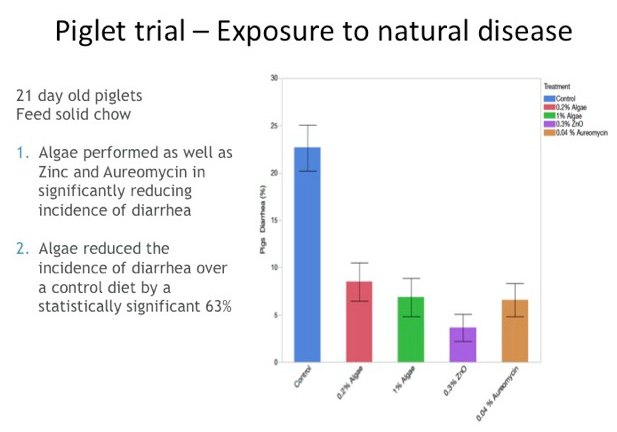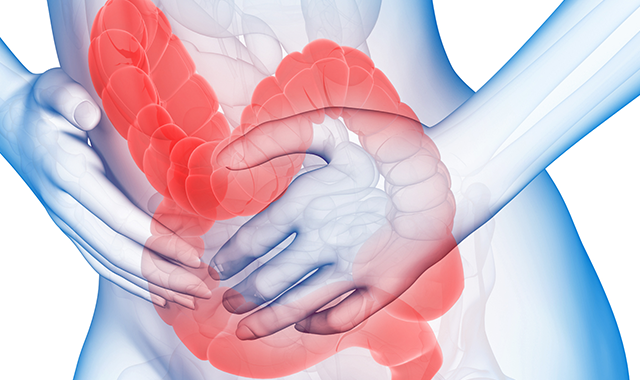Science Background
Learn about the science behind our Algae Nutritional Research Study
Overview
The human microbiome – the collection of microbial organisms living in and on your body – has been shown to collectively represent up to 99% of the genes in human body. These microbes, most of which are found in the gut, help facilitate digestion, are critical for appropriate immune system maturation and function, and help to ward off pathogens. Several things can affect the microbiome, including diet, medications, and travel, and increasingly, research is showing that one of the simplest ways to alter gut microbiome composition is through dietary changes. We are proposing a dietary consumption study that will help determine the effects of daily supplementation with a nutritious green algae powder (Chlamydomonas reinhardtii) on gut microbiome diversity, composition, and function.
 Multiple trials in mice and pigs have demonstrated that this alga has a positive impact on normal gut health and function (i.e. by reducing symptoms of gastrointestinal distress, including diarrhea, and by improving stool quality) and we are interested in whether similar effects can be observed in people. Additionally, we wish to determine whether this alga changes the composition of the gut microbiome, and whether these changes correlate with decreased gastrointestinal irritation and discomfort.
Multiple trials in mice and pigs have demonstrated that this alga has a positive impact on normal gut health and function (i.e. by reducing symptoms of gastrointestinal distress, including diarrhea, and by improving stool quality) and we are interested in whether similar effects can be observed in people. Additionally, we wish to determine whether this alga changes the composition of the gut microbiome, and whether these changes correlate with decreased gastrointestinal irritation and discomfort.
Specific Aims of the Study

Current microbiome research strongly supports dietary changes as an easily modifiable factor that can affect the gut microbiome. We would like to determine whether regular consumption of this algae, in the absence of any other substantive dietary changes, will result in beneficial effects on normal gut health and digestion in three groups (up to 50 people per group): athletes, individuals who have experienced mild IBS-like symptoms, and healthy people with no known gut irregularities. Specifically, individuals in this study will collect stool samples on three different occasions over the course of the study. Samples from some individuals will be submitted for microbial sequencing and analysis through the American Gut Project (UCSD HRPP approved protocol #141853). Additionally, participants will be asked to keep track of their daily dietary habits, and their general well-being, by responding to several questions about how they feel; i.e. has their gut discomfort decreased, have their energy levels improved, and has their stool consistency changed, and these changes in their perceived well being will be captured in a questionnaire (attached to this application). We will use these data to determine whether algae supplementation positively affected the gut microbiome by increasing diversity and reducing relative abundance of inflammation-associated taxa, and where these changes are associated with overall gut health and well-being as qualitatively judged by the participants.
Background and Significance
Trillions of microorganisms live on and within the human body. We are colonized at birth and continuously inhabited throughout our lifetime, and even the decomposition process is affected by our resident microbes. Our microbes occupy many body habitats, including the skin, mucosal surfaces, and the gastrointestinal tract. Together, the genomes of our microbial partners (collectively defined as the human microbiome) contain 360 times more genes than our own human genomes, and provide traits that are tightly linked to human health (Turnbaugh et al., 2007). This intimate relationship, involving a blend of human and microbial cells, genes, and metabolic features, evokes a concept of humans as “supra-organisms”.
Our microbial symbionts are largely either harmless or beneficial; for example, we rely on our gut microbiome to assist in nutrition, resist pathogens, and activate our immune system (Ley et al., 2006; Dethiefsen et al., 2007; Turnbaugh et al., 2007. Studies have shown that both short-term and long-term dietary changes affect gut microbiome composition and metabolic activity (David et al., 2014), thereby positioning dietary interventions as one of the easiest and quickest means by which to affect changes in the gut microbiome. Because of this, there is significant interest in using diet to affect positive changes to the microbiome, in an effort to reduce or relieve symptoms of various disease states. However, research to date suggests that the interrelationship between diet and the microbiome is a complex system to map. For example, recent work in a large cohort of diabetic patients revealed that while diet can be an effective way to control blood sugar levels, the same food item can have very different effects in some individuals, and this appears to be based at least in part on their microbiome (Zeevi et al., 2015). This outcome suggests that dietary interventions may need to be highly individualized. Whether this is the case in all geographic regions of the world, and in all disease states, is unknown, and will require well-designed, controlled studies. Here we propose to determine the effects of daily supplementation with the green algae Chlamydomonas reinhardtii (C. reinhardtii) on the gut microbiome and on overall gut health.
C. reinhardtii is a green alga rich in Vitamin A, b-carotene, chlorophyll and iron; it also features high levels of easily digested protein, and is an excellent source of Omega-3 and Omega-6 fatty acids). C. reinhardtii is a very closely studied and scientifically well-understood algae; and recent studies in both mice and pigs have reported a significant decrease in diarrhea and an increase in body weight gain in animals consuming this algae as part of their daily diet. This is intriguing, given that there is a significant portion of the US (and global) population which experiences occasional symptoms of intestinal distress, such as gas, bloating, constipation, diarrhea, or intestinal pain, and market research indicates that this demographic is very eager to identify a solution that is efficacious, and natural/non-pharmaceutical. In our mouse studies (with Dr. John Chang UCSD Dept. of Medicine), diarrhea was induced by a chemical challenge, while in the pig study, diarrhea occurred after a combination of stress and a new diet. While neither scenario can be directly compared to human gut function, both animal groups had symptoms associated with severe gastrointestinal distress and poor gut health. While C. reinhardtii has not historically been consumed as human food, it has now undergone a comprehensive battery of safety studies to ensure that it is safe for human consumption. To date, it has undergone four separate studies to test for mutagenicity, clastogenicity, and genotoxicity (all showing no adverse effects) and a 28-day feeding study in rats that demonstrated that it can safely be consumed by mammals for an extended period of time.
Working with the American Gut Project, we hope to attract a number of individuals willing to consume the algae and collect stool samples so that we can gauge the impact of this algae on their digestive system. It is also our hope that this study will be useful to comprehensively quantify the broader benefits to be derived from algae consumption in humans. To this end, there is no substitute for the response and feedback of human subjects – and their corresponding experiences – that could provide the information we seek.
